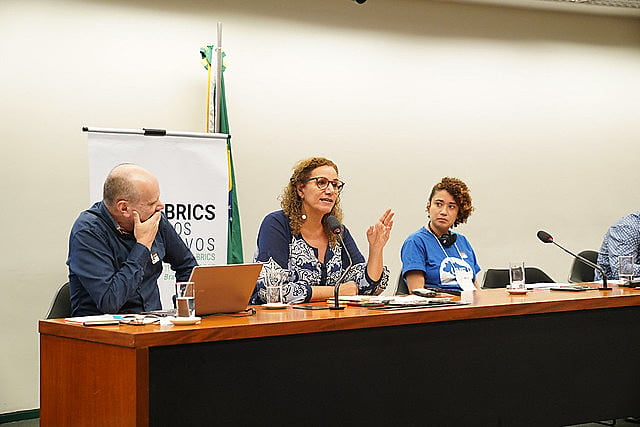The growing tensions between capitalism and democracy around the world were the theme of the third discussion panel of the Peoples’ BRICS International Summit, International Political Crises and People’s Struggles.
The panelists who took part in the discussion on Tuesday morning spoke about how global disputes create challenges and possibilities for forging alternative projects by the people of each country.
Andrey Pyatakov, of the think tank Russian International Affairs Council (RIAC), spoke about the current international scenario based on two different concepts. In his opinion, the key contradiction in the world still is between “capital and work” — or workers and those who exploit them. But this tension is “latent.”
The main opposing forces in the international arena, according to Pyatakov, are the States that are aligned with the interests of transnational financial capital and the countries that pursue some kind of autonomous capitalist development.
This antagonism between the two models has been raising tensions in different parts of the world. Mentioning the Ukranian conflict, Pyatakov argues that the strategic goal of the segments aligned with transnational capital was to weaken Russia as part of a “global offensive.”
“The world today is not facing an outright opposition between global capital and global labor,” Pyatakov said. “The forces that inspire these focus of warfare are trying to impose on humanity a neo-fascist dictatorship of the most aggressive, reactionary sectors of transnational capital. These nefarious plans create an even bigger danger not only to democracy and the rights achieved by workers around the world, but also to human life,” he added.
Ilam Shaheen Khan, a member of the recently launched Socialist Revolutionary Workers Party of South Africa, pointed out that the international capitalist crisis has been lingering for more than a decade. Arguing that “the bourgeoisie has not come up with solutions” for it, Khan added that expropriation of the majority of the world’s population has become ever stronger.
“The capitalist crisis pushes the bourgeois governments all around the world to attack the remaining social gains of the masses,” Khan underscored. “The increasing erosion of the social basis and popular support for these governments forces them to rely more and more on authoritarian laws and repression.”
The Brazilian congresswoman Jandira Feghali, of the Communist Party of Brazil, added that not only repression and authoritarianism are growing, but new communication strategies, notably online, are being used to “forge fabricated forms of consciousness,” making parts of workers become ideologically endorse platforms that are against their own interests.
Because of this, Feghali argues, capitalism and democracy are more and more taking separate ways. “It’s impossible to push such a profound agenda of inequality, create a mass of disposable people, without suppressing democracy,” she said, adding that communication and ideological factors have become parts of the process, “creating cultural change.” “This takes a toll on the processes of twisting democracy.”
A professor at the Federal University of the ABC Metro Area, Giorgio Romano addressed the battle between the United States and China, arguing that, especially after the 2008 crisis, the Asian country started to adopt a more active attitude in foreign policy, and that laid the foundation for several focuses of instability around the world.
“In the second decade of the 21st century, the world has been witnessing the US determination to reorganize its hegemony, with impacts on all members of the international system,” Romano said. “On the other hand, China emerged not only as an economic power, but now also with the drive and will to fight to become a technological leader.”
Romano advocated for the theory that liberal capitalism, represented internationally by the US, has been unable to present alternatives that can solve the problems that are ravaging humanity, including the devastation of the environment and the growing social inequality.
In this sense, Romano pointed out that the Chinese model could represent an actual alternative to tackle those problems. The scholar said that it is still hard to provide details about the role that China may play in the global scenario, even though, in his opinion, the country also has issues in several areas.
“The crisis is precisely about the fact that the old is dying and the new cannot be born yet. During this lapse, which is the moment we are experiencing right now, a great variety of morbid symptoms come up. The old will resist until death through all means possible. The matter at hand is whether the expansion of Chinese capitalism is part of the lapse or of the construction of something new,” he said.
The Peoples’ BRICS Summit is holding one last panel on Tuesday afternoon.
After the first panel of the day, the participants of the meeting joined a demonstration outside the Bolivian Embassy in Brasília in solidarity with the Bolivian people and Evo Morales.




